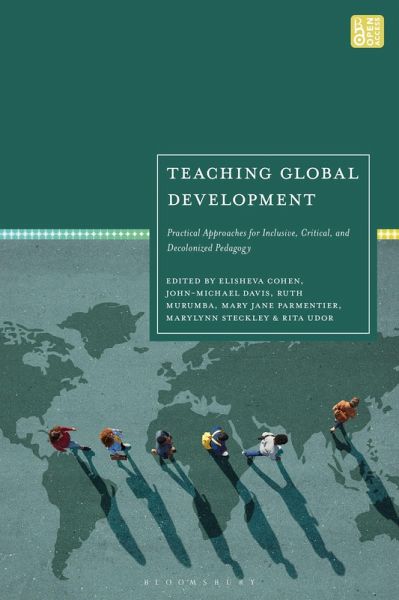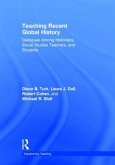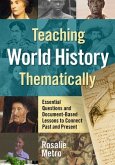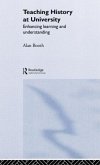Teaching Global Development
Practical Approaches for Inclusive, Critical, and Decolonized Pedagogy
Herausgeber: Cohen, Elisheva; Udor, Rita; Steckley, Marylynn; Parmentier, Mary Jane; Murumba, Ruth; Davis, John-Michael
132,99 €
inkl. MwSt.
Versandkostenfrei*
Erscheint vorauss. 11. Dezember 2025
Melden Sie sich
hier
hier
für den Produktalarm an, um über die Verfügbarkeit des Produkts informiert zu werden.

66 °P sammeln
Teaching Global Development
Practical Approaches for Inclusive, Critical, and Decolonized Pedagogy
Herausgeber: Cohen, Elisheva; Udor, Rita; Steckley, Marylynn; Parmentier, Mary Jane; Murumba, Ruth; Davis, John-Michael
- Gebundenes Buch
The first volume of its kind, Teaching Global Development offers a unique collection of current approaches to teaching development in ways that foreground such core ethical issues. Hailing from a range of disciplines and from across the world, the contributors gathered here describe what "global development" means in their context, offer strategies for more ethical syllabi, describe innovative ways to explore equity and diversity through readings and activities, and provide detailed case studies of GDS-related programs. Throughout, these chapters showcase new and innovative approaches to…mehr
Andere Kunden interessierten sich auch für
![Teaching Recent Global History Teaching Recent Global History]() Diana B TurkTeaching Recent Global History154,99 €
Diana B TurkTeaching Recent Global History154,99 €![Teaching History Online Teaching History Online]() John F LyonsTeaching History Online197,99 €
John F LyonsTeaching History Online197,99 €![Teaching World History Thematically Teaching World History Thematically]() Rosalie MetroTeaching World History Thematically135,99 €
Rosalie MetroTeaching World History Thematically135,99 €![A Primer for Teaching Environmental History A Primer for Teaching Environmental History]() Emily WakildA Primer for Teaching Environmental History137,99 €
Emily WakildA Primer for Teaching Environmental History137,99 €![Teaching History at University Teaching History at University]() Alan BoothTeaching History at University196,99 €
Alan BoothTeaching History at University196,99 €![Teaching History Teaching History]() William CaferroTeaching History37,99 €
William CaferroTeaching History37,99 €![Writing, Teaching and Researching History in the Electronic Age Writing, Teaching and Researching History in the Electronic Age]() Dennis A TrinkleWriting, Teaching and Researching History in the Electronic Age198,99 €
Dennis A TrinkleWriting, Teaching and Researching History in the Electronic Age198,99 €-
-
-
The first volume of its kind, Teaching Global Development offers a unique collection of current approaches to teaching development in ways that foreground such core ethical issues. Hailing from a range of disciplines and from across the world, the contributors gathered here describe what "global development" means in their context, offer strategies for more ethical syllabi, describe innovative ways to explore equity and diversity through readings and activities, and provide detailed case studies of GDS-related programs. Throughout, these chapters showcase new and innovative approaches to service learning, lesson plans, and activities that demonstrate what critical, decolonized, DEI-sensitive knowledge actually looks like. For its topical breadth, theoretical sophistication, and uniquely concrete examples and suggestions, this book is a must-read for scholars, instructors, and students interested in the ethics not only of global development, but also of curriculum-setting and pedagogy more broadly. The ebook editions of this book are available open access under a CC BY-NC-ND 4.0 licence on bloomsburycollections.com. Open access was funded by Indiana University and Worcester Polytechnic Institute.
Hinweis: Dieser Artikel kann nur an eine deutsche Lieferadresse ausgeliefert werden.
Hinweis: Dieser Artikel kann nur an eine deutsche Lieferadresse ausgeliefert werden.
Produktdetails
- Produktdetails
- Verlag: Bloomsbury Academic
- Seitenzahl: 256
- Erscheinungstermin: 11. Dezember 2025
- Englisch
- Abmessung: 234mm x 156mm x 25mm
- Gewicht: 454g
- ISBN-13: 9781350426016
- ISBN-10: 1350426016
- Artikelnr.: 72489413
- Herstellerkennzeichnung
- Libri GmbH
- Europaallee 1
- 36244 Bad Hersfeld
- gpsr@libri.de
- Verlag: Bloomsbury Academic
- Seitenzahl: 256
- Erscheinungstermin: 11. Dezember 2025
- Englisch
- Abmessung: 234mm x 156mm x 25mm
- Gewicht: 454g
- ISBN-13: 9781350426016
- ISBN-10: 1350426016
- Artikelnr.: 72489413
- Herstellerkennzeichnung
- Libri GmbH
- Europaallee 1
- 36244 Bad Hersfeld
- gpsr@libri.de
Elisheva Cohen is Director of International Education Programs at the Hamilton Lugar School for Global and International Studies at Indiana University, USA. She holds a PhD in International Development and Education from the University of Minnesota. For two years, she convened an international conference on pedagogy in international development studies. John-Michael Davis is an Assistant Teaching Professor in the Department of Integrated and Global Studies at Worcester Polytechnic Institute, USA. He co-directs the Puerto Rico Project Center where he builds relationships with Puerto Rican organizations to facilitate reciprocal and impactful project-based learning opportunities for students. Ruth Murumba holds an MA in Development Studies from the University of Glasgow and is a PhD candidate who studied development studies at Moi University in Kenya (graduation expected in December 2022). Her research focuses on the social sustainability of development projects in informal settlements in Nairobi, Kenya. She has over ten years of experience teaching international development studies. Mary Jane Parmentier is a Clinical Professor at Arizona State University, USA, in the School for the Future of Innovation in Society and the College of Global Futures. For over 20 years she has published research on innovative pedagogy for teaching global development studies in the classroom, online, and in the field. Marylynn Steckley is an Assistant Professor in Global and International Studies at Carleton University, Canada. Dr. Steckley is deeply interested in pedagogical innovations in virtual international experiential learning to enhance inclusive learning opportunities for students. Rita Udor is a lecturer at Simon Diedong Dombo University of Business and Integrated Development Studies, Ghana, and is affiliated with the Department of Development Studies. She teaches gender and development, community mobilization and development, population and development among others courses.
Introduction: Teaching to Decolonizing Development, Elisheva Cohen,
John-Michael Davis, Ruth Murumba, Mary Jane Parmentier, Marylynn Steckley,
Rita Udor
Section 1: Global Experiential Learning on Campus and Beyond
Chapter 1. Global Experiential Learning: (De)Constructing Housing Justice
in Tijuana, Mexico, Audrey Hudgins, Seattle University; Ernesto Aguilar-S.,
Fundación Esperanza de México
Chapter 2. Digesting Food Systems through Land-Based Pedagogy: Enhancing
Academia with Experiential-Learning and Cultural Knowledge, Agnieszka
Pawlowska-Mainville, University of Northern British Columbia
Chapter 3. Multi-Day Role Plays: Exploring Local Sovereignty in Developing
Contexts, David Kupp, Wycliffe College & Humber College; Ian DeVilliers,
World Vision International
Chapter 4. A Decolonial and Experiential Learning Course Design: Global
Social Thought, Saleena Saleem, University of Liverpool
Section 2: Decolonization and DEI in Pedagogy
Chapter 5. Decolonizing Teaching of Development Studies through Social
Learning, Charity Chisoro, Africa Centre for Evidence; Aziza Modise, Africa
Centre for Evidence
Chapter 6. Conversations in Decolonizing GDS: Process, Obstacles and
Opportunities, Georgina Alonso, University of Ottowa; Jess Notwell, King's
University College; Adrian Murray, University of Johannesburg
Chapter 7. The Pedagogy of Decolonial Development Futures: Building on
Decolonizing Past and Present in Development Studies Teaching Praxis,
Jonathan Langdon, St. Francis Xavier University; Ajay Parasram, Dalhousie
University
Chapter 8. Decolonizing Knowledge Acquisition: Embedding Indigenous
Practices in Class, Natalia Tereshchenko, Corvuss American Academy
Chapter 9. Conceptualizing Decolonization as an "Actionable" Framework:
What's the Syllabus Got To Do with It?, Theresa E. Cann, Teachers College
Columbia University
Section 3: Critical Innovations in the Classroom
Chapter 10. Linking Theory to Practice: A Case Study from the Global South,
Abdulai Adams, Simon Diedong Dombo University of Business and Integrated
Development Studies; Rita Udor, Simon Diedong Dombo University of Business
and Integrated Development Studies
Chapter 11. Culturally-Relevant Gender-Based Analysis (CRGBA) as a
Pedagogical Tool in Global Contexts, Chloe Hamilton, Native Women's
Association of Canada and Carleton University
Chapter 12. Open Educational Resources in Global Development Studies:
Promoting Equity and Representation, Courtney Kurlanska, Worcester
Polytechnic Institute; Sarah Stanlick, Worcester Polytechnic Institute
Chapter 13. Using Digital Stories and Photovoice to Center Student
Subjectivities in Global Development Education, Juan Carlos Jimenez,
University of Toronto
Chapter 14. Building Early Foundations: Using the "Interdependence: Global
Solidarity and Local Actions Toolkit" in the First-Year GDS Classroom,
Julie Ficarra, Cornell University
Chapter 15. Personalizing Critical Development Studies: Using Diaries as
Pedagogical Tool for Deep Reflection, Lee Rensimer, University College
London; Kamna Patel, University College London
Chapter 16. Building Critical Development Research Skills through
Co-Learning, Trial and Error, Roberta Hawkins, University of Guelph
Chapter 17. Let's Be Honest About Impact: Training Reflexive Researchers,
Telisa Courtney, University of Alberta; John Battye, MacEwan University
John-Michael Davis, Ruth Murumba, Mary Jane Parmentier, Marylynn Steckley,
Rita Udor
Section 1: Global Experiential Learning on Campus and Beyond
Chapter 1. Global Experiential Learning: (De)Constructing Housing Justice
in Tijuana, Mexico, Audrey Hudgins, Seattle University; Ernesto Aguilar-S.,
Fundación Esperanza de México
Chapter 2. Digesting Food Systems through Land-Based Pedagogy: Enhancing
Academia with Experiential-Learning and Cultural Knowledge, Agnieszka
Pawlowska-Mainville, University of Northern British Columbia
Chapter 3. Multi-Day Role Plays: Exploring Local Sovereignty in Developing
Contexts, David Kupp, Wycliffe College & Humber College; Ian DeVilliers,
World Vision International
Chapter 4. A Decolonial and Experiential Learning Course Design: Global
Social Thought, Saleena Saleem, University of Liverpool
Section 2: Decolonization and DEI in Pedagogy
Chapter 5. Decolonizing Teaching of Development Studies through Social
Learning, Charity Chisoro, Africa Centre for Evidence; Aziza Modise, Africa
Centre for Evidence
Chapter 6. Conversations in Decolonizing GDS: Process, Obstacles and
Opportunities, Georgina Alonso, University of Ottowa; Jess Notwell, King's
University College; Adrian Murray, University of Johannesburg
Chapter 7. The Pedagogy of Decolonial Development Futures: Building on
Decolonizing Past and Present in Development Studies Teaching Praxis,
Jonathan Langdon, St. Francis Xavier University; Ajay Parasram, Dalhousie
University
Chapter 8. Decolonizing Knowledge Acquisition: Embedding Indigenous
Practices in Class, Natalia Tereshchenko, Corvuss American Academy
Chapter 9. Conceptualizing Decolonization as an "Actionable" Framework:
What's the Syllabus Got To Do with It?, Theresa E. Cann, Teachers College
Columbia University
Section 3: Critical Innovations in the Classroom
Chapter 10. Linking Theory to Practice: A Case Study from the Global South,
Abdulai Adams, Simon Diedong Dombo University of Business and Integrated
Development Studies; Rita Udor, Simon Diedong Dombo University of Business
and Integrated Development Studies
Chapter 11. Culturally-Relevant Gender-Based Analysis (CRGBA) as a
Pedagogical Tool in Global Contexts, Chloe Hamilton, Native Women's
Association of Canada and Carleton University
Chapter 12. Open Educational Resources in Global Development Studies:
Promoting Equity and Representation, Courtney Kurlanska, Worcester
Polytechnic Institute; Sarah Stanlick, Worcester Polytechnic Institute
Chapter 13. Using Digital Stories and Photovoice to Center Student
Subjectivities in Global Development Education, Juan Carlos Jimenez,
University of Toronto
Chapter 14. Building Early Foundations: Using the "Interdependence: Global
Solidarity and Local Actions Toolkit" in the First-Year GDS Classroom,
Julie Ficarra, Cornell University
Chapter 15. Personalizing Critical Development Studies: Using Diaries as
Pedagogical Tool for Deep Reflection, Lee Rensimer, University College
London; Kamna Patel, University College London
Chapter 16. Building Critical Development Research Skills through
Co-Learning, Trial and Error, Roberta Hawkins, University of Guelph
Chapter 17. Let's Be Honest About Impact: Training Reflexive Researchers,
Telisa Courtney, University of Alberta; John Battye, MacEwan University
Introduction: Teaching to Decolonizing Development, Elisheva Cohen,
John-Michael Davis, Ruth Murumba, Mary Jane Parmentier, Marylynn Steckley,
Rita Udor
Section 1: Global Experiential Learning on Campus and Beyond
Chapter 1. Global Experiential Learning: (De)Constructing Housing Justice
in Tijuana, Mexico, Audrey Hudgins, Seattle University; Ernesto Aguilar-S.,
Fundación Esperanza de México
Chapter 2. Digesting Food Systems through Land-Based Pedagogy: Enhancing
Academia with Experiential-Learning and Cultural Knowledge, Agnieszka
Pawlowska-Mainville, University of Northern British Columbia
Chapter 3. Multi-Day Role Plays: Exploring Local Sovereignty in Developing
Contexts, David Kupp, Wycliffe College & Humber College; Ian DeVilliers,
World Vision International
Chapter 4. A Decolonial and Experiential Learning Course Design: Global
Social Thought, Saleena Saleem, University of Liverpool
Section 2: Decolonization and DEI in Pedagogy
Chapter 5. Decolonizing Teaching of Development Studies through Social
Learning, Charity Chisoro, Africa Centre for Evidence; Aziza Modise, Africa
Centre for Evidence
Chapter 6. Conversations in Decolonizing GDS: Process, Obstacles and
Opportunities, Georgina Alonso, University of Ottowa; Jess Notwell, King's
University College; Adrian Murray, University of Johannesburg
Chapter 7. The Pedagogy of Decolonial Development Futures: Building on
Decolonizing Past and Present in Development Studies Teaching Praxis,
Jonathan Langdon, St. Francis Xavier University; Ajay Parasram, Dalhousie
University
Chapter 8. Decolonizing Knowledge Acquisition: Embedding Indigenous
Practices in Class, Natalia Tereshchenko, Corvuss American Academy
Chapter 9. Conceptualizing Decolonization as an "Actionable" Framework:
What's the Syllabus Got To Do with It?, Theresa E. Cann, Teachers College
Columbia University
Section 3: Critical Innovations in the Classroom
Chapter 10. Linking Theory to Practice: A Case Study from the Global South,
Abdulai Adams, Simon Diedong Dombo University of Business and Integrated
Development Studies; Rita Udor, Simon Diedong Dombo University of Business
and Integrated Development Studies
Chapter 11. Culturally-Relevant Gender-Based Analysis (CRGBA) as a
Pedagogical Tool in Global Contexts, Chloe Hamilton, Native Women's
Association of Canada and Carleton University
Chapter 12. Open Educational Resources in Global Development Studies:
Promoting Equity and Representation, Courtney Kurlanska, Worcester
Polytechnic Institute; Sarah Stanlick, Worcester Polytechnic Institute
Chapter 13. Using Digital Stories and Photovoice to Center Student
Subjectivities in Global Development Education, Juan Carlos Jimenez,
University of Toronto
Chapter 14. Building Early Foundations: Using the "Interdependence: Global
Solidarity and Local Actions Toolkit" in the First-Year GDS Classroom,
Julie Ficarra, Cornell University
Chapter 15. Personalizing Critical Development Studies: Using Diaries as
Pedagogical Tool for Deep Reflection, Lee Rensimer, University College
London; Kamna Patel, University College London
Chapter 16. Building Critical Development Research Skills through
Co-Learning, Trial and Error, Roberta Hawkins, University of Guelph
Chapter 17. Let's Be Honest About Impact: Training Reflexive Researchers,
Telisa Courtney, University of Alberta; John Battye, MacEwan University
John-Michael Davis, Ruth Murumba, Mary Jane Parmentier, Marylynn Steckley,
Rita Udor
Section 1: Global Experiential Learning on Campus and Beyond
Chapter 1. Global Experiential Learning: (De)Constructing Housing Justice
in Tijuana, Mexico, Audrey Hudgins, Seattle University; Ernesto Aguilar-S.,
Fundación Esperanza de México
Chapter 2. Digesting Food Systems through Land-Based Pedagogy: Enhancing
Academia with Experiential-Learning and Cultural Knowledge, Agnieszka
Pawlowska-Mainville, University of Northern British Columbia
Chapter 3. Multi-Day Role Plays: Exploring Local Sovereignty in Developing
Contexts, David Kupp, Wycliffe College & Humber College; Ian DeVilliers,
World Vision International
Chapter 4. A Decolonial and Experiential Learning Course Design: Global
Social Thought, Saleena Saleem, University of Liverpool
Section 2: Decolonization and DEI in Pedagogy
Chapter 5. Decolonizing Teaching of Development Studies through Social
Learning, Charity Chisoro, Africa Centre for Evidence; Aziza Modise, Africa
Centre for Evidence
Chapter 6. Conversations in Decolonizing GDS: Process, Obstacles and
Opportunities, Georgina Alonso, University of Ottowa; Jess Notwell, King's
University College; Adrian Murray, University of Johannesburg
Chapter 7. The Pedagogy of Decolonial Development Futures: Building on
Decolonizing Past and Present in Development Studies Teaching Praxis,
Jonathan Langdon, St. Francis Xavier University; Ajay Parasram, Dalhousie
University
Chapter 8. Decolonizing Knowledge Acquisition: Embedding Indigenous
Practices in Class, Natalia Tereshchenko, Corvuss American Academy
Chapter 9. Conceptualizing Decolonization as an "Actionable" Framework:
What's the Syllabus Got To Do with It?, Theresa E. Cann, Teachers College
Columbia University
Section 3: Critical Innovations in the Classroom
Chapter 10. Linking Theory to Practice: A Case Study from the Global South,
Abdulai Adams, Simon Diedong Dombo University of Business and Integrated
Development Studies; Rita Udor, Simon Diedong Dombo University of Business
and Integrated Development Studies
Chapter 11. Culturally-Relevant Gender-Based Analysis (CRGBA) as a
Pedagogical Tool in Global Contexts, Chloe Hamilton, Native Women's
Association of Canada and Carleton University
Chapter 12. Open Educational Resources in Global Development Studies:
Promoting Equity and Representation, Courtney Kurlanska, Worcester
Polytechnic Institute; Sarah Stanlick, Worcester Polytechnic Institute
Chapter 13. Using Digital Stories and Photovoice to Center Student
Subjectivities in Global Development Education, Juan Carlos Jimenez,
University of Toronto
Chapter 14. Building Early Foundations: Using the "Interdependence: Global
Solidarity and Local Actions Toolkit" in the First-Year GDS Classroom,
Julie Ficarra, Cornell University
Chapter 15. Personalizing Critical Development Studies: Using Diaries as
Pedagogical Tool for Deep Reflection, Lee Rensimer, University College
London; Kamna Patel, University College London
Chapter 16. Building Critical Development Research Skills through
Co-Learning, Trial and Error, Roberta Hawkins, University of Guelph
Chapter 17. Let's Be Honest About Impact: Training Reflexive Researchers,
Telisa Courtney, University of Alberta; John Battye, MacEwan University







